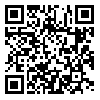Volume 14, Issue 3 (Aug & Sep 2020)
payavard 2020, 14(3): 250-263 |
Back to browse issues page
Download citation:
BibTeX | RIS | EndNote | Medlars | ProCite | Reference Manager | RefWorks
Send citation to:



BibTeX | RIS | EndNote | Medlars | ProCite | Reference Manager | RefWorks
Send citation to:
Safdari R, Larti F, Fathi Salari K, Mohammadpour S. Determining the Information Requirements of Electronic Prescribing and Medication Administration System for Cardiovascular Patients. payavard 2020; 14 (3) :250-263
URL: http://payavard.tums.ac.ir/article-1-7015-en.html
URL: http://payavard.tums.ac.ir/article-1-7015-en.html
1- Professor, Department of Health Information Management, School of Allied Medical Sciences, Tehran University of Medical Sciences, Tehran, Iran
2- Assistant Professor, Cardiologist, Fellowship in Echocardiography, Imam Khomeini Hospital, Tehran University of Medical Sciences, Tehran, Iran
3- Master of Science in Health Information Technology, School of Allied Medical Sciences, Tehran University of Medical Sciences, Tehran, Iran ,kamyar.fathisalari@gmail.com
4- Master of Science in Medical Informatics, School of Management and Information Science, Iran University of Medical Sciences, Tehran, Iran
2- Assistant Professor, Cardiologist, Fellowship in Echocardiography, Imam Khomeini Hospital, Tehran University of Medical Sciences, Tehran, Iran
3- Master of Science in Health Information Technology, School of Allied Medical Sciences, Tehran University of Medical Sciences, Tehran, Iran ,
4- Master of Science in Medical Informatics, School of Management and Information Science, Iran University of Medical Sciences, Tehran, Iran
Abstract: (2464 Views)
Background and Aim: Cardiovascular diseases and medication errors are among the leading causes of morbidity and mortality around the world. Electronic prescribing and Medication Administration(ePMA) systems can prevent medication errors to some extent. This study aimed to determine the information requirements of ePMA systems.
Materials and Methods: This descriptive study was conducted in Imam Khomeini Hospital of Tehran and School of Allied Medical Sciences affiliated to Tehran University of Medical Sciences (TUMS) in the summer of 2019 in two phases: literature review and survey-based questionnaire. Information items obtained from reviewing the texts of 100 articles were organized in three questionnaires. In the survey phase, questionnaires were distributed among physicians, nurses, and the experts of health information management(HIM) and medical informatics, using census sampling method. The reliability of the questionnaires was measured using Cronbach's coefficient alpha. Statistical analysis was done using SPSS.
Results: The findings showed that based on specialists’ point of view, patients' demographic information items and unique identifiers gained the highest average, above 4.7. Physicians agreed most with clinical information, including medication history and generic names. From the nurses’ point of view, the information items of the patients’ problems and the procedures performed and the types of drug doses obtained a complete average of 5.
Conclusion: The need for information items varies among different users of ePMA systems, but there may be items that are common for them. Future studies should further investigate financial and pharmaceutical information requirements based on the perspectives of other hospital pharmacy and accounting staff.
Materials and Methods: This descriptive study was conducted in Imam Khomeini Hospital of Tehran and School of Allied Medical Sciences affiliated to Tehran University of Medical Sciences (TUMS) in the summer of 2019 in two phases: literature review and survey-based questionnaire. Information items obtained from reviewing the texts of 100 articles were organized in three questionnaires. In the survey phase, questionnaires were distributed among physicians, nurses, and the experts of health information management(HIM) and medical informatics, using census sampling method. The reliability of the questionnaires was measured using Cronbach's coefficient alpha. Statistical analysis was done using SPSS.
Results: The findings showed that based on specialists’ point of view, patients' demographic information items and unique identifiers gained the highest average, above 4.7. Physicians agreed most with clinical information, including medication history and generic names. From the nurses’ point of view, the information items of the patients’ problems and the procedures performed and the types of drug doses obtained a complete average of 5.
Conclusion: The need for information items varies among different users of ePMA systems, but there may be items that are common for them. Future studies should further investigate financial and pharmaceutical information requirements based on the perspectives of other hospital pharmacy and accounting staff.
Keywords: Medication Administration, Computerized Physician Order Entry (COPE), Cardiovascular Diseases
Send email to the article author
| Rights and permissions | |
 |
This work is licensed under a Creative Commons Attribution-NonCommercial 4.0 International License. |





